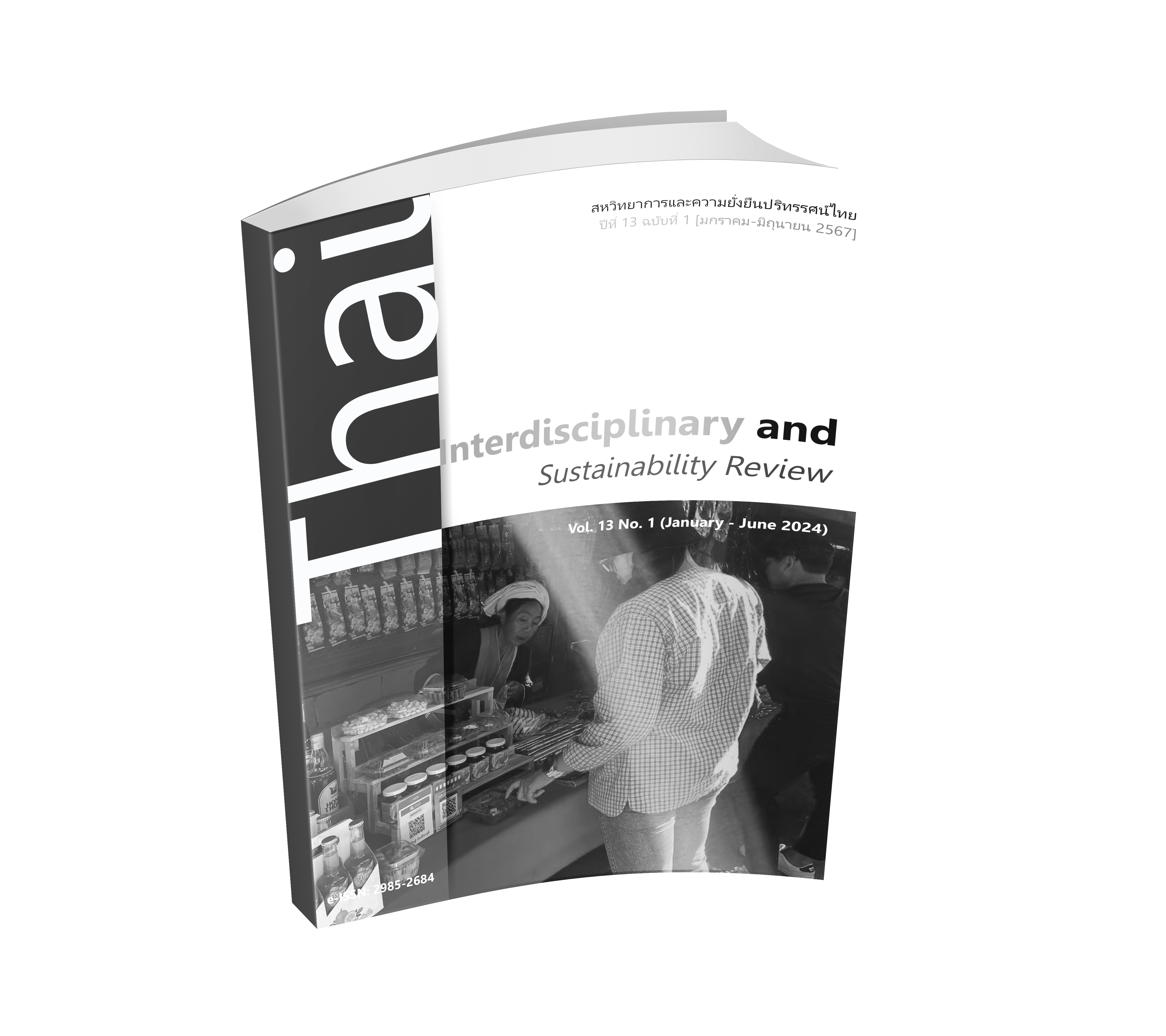IMPLEMENTATION OF THE CAUSAL MODEL OF BUSINESS PERFORMANCE OF COMMUNITY ENTERPRISES PRODUCING PROCESSED AGRICULTURAL PRODUCTS IN THE THREE SOUTHERN BORDER PROVINCES
DOI:
https://doi.org/10.14456/tisr.2024.16Keywords:
Business Performance, Community Enterprise, Agricultural Processed ProductsAbstract
The objective of this study is to implement the model of causal relationship between the business performances of community enterprises producing processed agricultural products in the three southern border provinces. The research design is a quasi-experiment that involves collecting data through interviews and conducting development practices with 4 members of a selected community enterprise and conducting surveys with 100 consumers. The results of the study show that the members of the selected community enterprise producing processed agricultural products improved their entrepreneurial skills, especially in the area of innovation, and their business management skills, especially in the areas of financial planning and accounting, production efficiency, product development, marketing and distribution, as they improved their business according to the given model. In addition, members can share their knowledge within the group and set guidelines for creating incentives. As a result, business performance has improved in various areas, including finance, customers, internal processes and learning and growth. However, the members of the group should continuously improve their entrepreneurial and business management skills to adapt to the changing business environment.
Downloads
References
กมลวรรณ สังทอง, ณัฐวุฒิ สังข์เพชร, ธนาภรณ์ ร่างสีคง, นุสรา บุญเฉลียว, ปรินธร สุขชู, พรรษา ภาบุบผากาญจน, วริษฐา ชะนะชัย, ศิครินทร์ ศรีกิจตยนนท์, อรรถธรรม อนงค์, ฬุลิยา ธีระธัญศิริกุล และ สิริภัทร์ โชติช่วง. (2563). ปัจจัยแห่งความสำเร็จด้านการบริหารจัดการของกลุ่มวิสาหกิจชุมชนเพื่อความยั่งยืน. วารสารธุรกิจปริทัศน์, 12(2), 211-220.
กรมส่งเสริมการเกษตร. (2565). รายงานสรุปผลการประมินศักยภาพวิสาหกิจชุมชน จำแนกตามพื้นที่. สืบค้นจาก http://smce.doae.go.th/smce1/report/select_report_smce.php?report_id=17.
กลุ่มงานบริหารยุทธศาสตร์กลุ่มจังหวัดภาคใต้ชายแดน. (2565). แผนพัฒนากลุ่มจังหวัดภาคชายแดน พ.ศ.2566-2570. สืบค้นจาก https://osmsouth-border.go.th/news_develop.
กาญจนา สุระ. (2562). การพัฒนาเพื่อยกระดับศักยภาพการจัดการธุรกิจของชุมชนท่องเที่ยวเชิงวัฒนธรรมจังหวัดเชียงใหม่. วารสารวิชาการมหาวิทยาลัยหอการค้าไทย มนุษยศาสตร์และสังคมศาสตร์, 39(4), 89-114.
ทวี วัชระเกียรติศักดิ์, ศิริพร เลิศยิ่งยศ และ ยุทธกร ฤทธิ์ไธสง. (2562). การพัฒนารูปแบบความสำเร็จในการประกอบการสำหรับวิสาหกิจรายย่อย. วารสารวิชาการบริหารธุรกิจสมาคมสถาบันอุดมศึกษาเอกชนแห่งประเทศไทยในพระราชูปถัมภ์ สมเด็จพระเทพรัตนราชสุดาฯ สยามบรมราชกุมารี, 8(2), 118-141.
ธนภรณ์ จันทร์แย้ม, อนุชิต โมลา และ กัมปนาท วงษ์วัฒนพงษ์. (2566). นโยบายการพัฒนาวิสาหกิจชุมชนยั่งยืนเพื่อสร้างความเข้มแข็งเศรษฐกิจฐานรากของท้องถิ่น. วารสารสหวิทยาการวิจัยและวิชาการ, 3(4), 575-586.
ปริษา ชาติวาณิชกุล, สุชีรา ธนาวุฒิ และ สุธาสินี โพธิ์ชาธาร. (2564). อิทธิพลของการบริหารจัดการธุรกิจและกลยุทธ์ทางธุรกิจที่มีต่อผลการดำเนินงานของธุรกิจชุมชน ในจังหวัดนครราชสีมา. วารสารชุมชนวิจัยและพัฒนาสังคม, 16(1), 194-205.
พชรพร วงษ์วาน. (2563). แนวทางการบริหารการพัฒนาวิสาหกิจชุมชนสู่ความสำเร็จอย่างยั่งยืนของจังหวัดเพชรบุรี. วารสารบัณฑิตวิทยาลัย มหาวิทยาลัยราชภัฏจันทรเกษม, 15(1), 100-111.
รัชดา ภักดียิ่ง. (2563). การพัฒนาศักยภาพการดำเนินงานของวิสาหกิจชุมชนในจังหวัดขอนแก่น. Journal of Buddhist Education and Research, 6(1), 175-189.
สัสดี กำแพงดี, ปิยะดา มณีนิล และ ชมพูนุท ศรีพงษ์. (2566). โมเดลเชิงสาเหตุของการดำเนินธุรกิจของวิสาหกิจชุมชนผลิตสินค้าเกษตรแปรรูปในสามจังหวัดชายแดนภาคใต้. ยะลา: มหาวิทยาลัยราชภัฏยะลา.
สำนักงานสภาพัฒนาการเศรษฐกิจและสังคมแห่งชาติ. (2565). แผนพัฒนาเศรษฐกิจและสังคมแห่งชาติ ฉบับที่ 13 (พ.ศ.2566-2570). สืบค้นจาก www.nesdc.go.th/article_attach/article_file_20230307173518.pdf.
Arabeche, Z., Soudani, A., Brahmi, M., Aldieri, L., Vinci, C., & Abdelli, M. (2022). Entrepreneurial Orientation, Organizational Culture and Business Performance in SMEs: Evidence from Emerging Economy. Sustainability, 14(9), 5160.
Kanaan-Jebna, J., Alabdullah, T., Ahmed, E., & Ayyasamy, R. (2022). Firm Performance and the Impact of Entrepreneurial Education and Entrepreneurial Competencies. Business Ethics and Leadership, 6(2), 68-77.
Kaplan, R., & Norton, D. (1996). The Balanced Scorecard: Translating Strategy into Action. Massachusetts: Harvard Business School Press.
Kyal, H., Mandal, A., Kujur, F., & Guha, S. (2022). Individual Entrepreneurial Orientation on MSME's Performance: The Mediating Effect of Employee Motivation and the Moderating Effect of Government Intervention. IIM Ranchi Journal of Management Studies, 1(1), 21-37.
Lawless, H., & Heymann, H. (2010). Sensory Evaluation of Food: Principles and Practices. Berlin: Springer.
Lim, C., & Teoh, K. (2021). Factors Influencing the SME Business Success in Malaysia. Annals of Human Resource Management Research, 1(1), 41-54.
Lumpkin, G., & Dess, G. (1996). Clarifying the Entrepreneurial Orientation Construct and Linking It to Performance. Academy of Management Review, 21(1), 135-172.
Sariwulan, T., Suparno, S., Disman, D., Ahman, E., & Suwatno, S. (2020). Entrepreneurial Performance: The Role of Literacy and Skills. The Journal of Asian Finance, Economics and Business, 7(11), 269-280.
Xiao, Y., Wu, K., Finn, D., & Chandrasekhar, D. (2022). Community Businesses as Social Units in Post-Disaster Recovery. Journal of Planning Education and Research, 42(1), 76-89.

Downloads
Published
How to Cite
Issue
Section
License
Copyright (c) 2024 Authors

This work is licensed under a Creative Commons Attribution-NonCommercial-NoDerivatives 4.0 International License.









.png)


